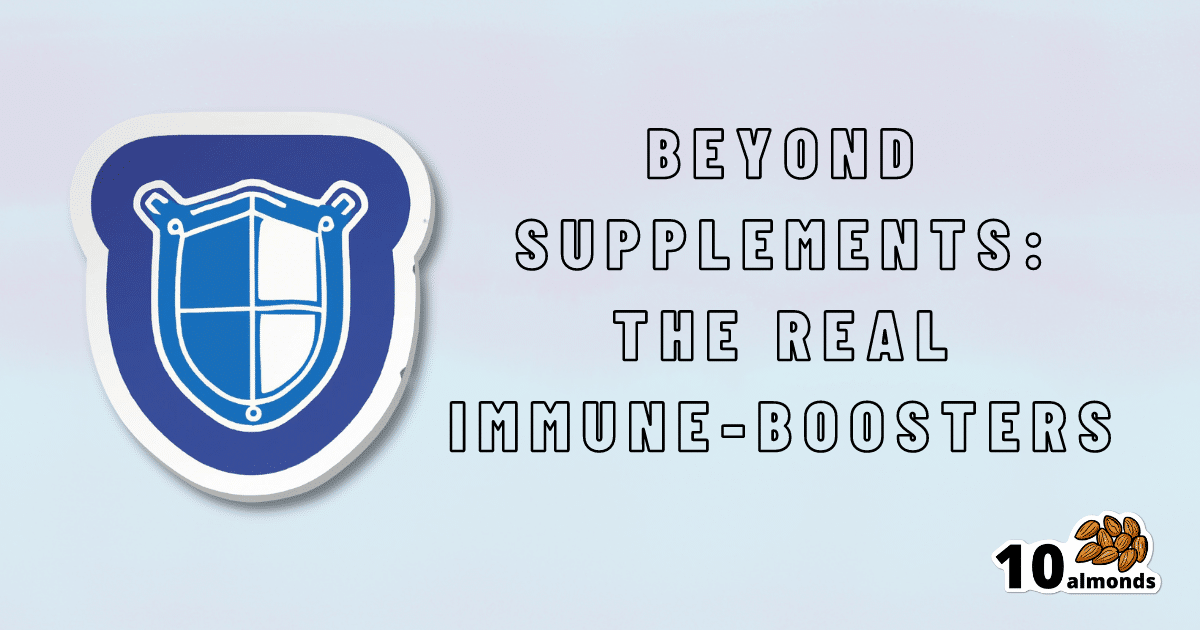Beyond Supplements: The Real Immune-Boosters!
The Real Immune-Boosters: Sleep for at least 7 hours, eat an anti-inflammatory diet, take care of your gut microbiota, get moderate exercise, manage stress levels, and consider supplements like Vitamin C and Zinc. Stay well!

The Real Immune-Boosters
What comes to your mind when we say “immune support”? Vitamin C and maybe zinc? Those have their place, but there are things we can do that are a lot more important!
It’s just, these things are not talked about as much, because stores can’t sell them to you 😉
Sleep
One of the biggest difference-makers. Get good sleep! Getting at least 7 hours decent sleep (not lying in bed, not counting interruptions to sleep as part of the sleep duration) can improve your immune system by three or four times.
Put another way, people are 3–4 times more likely to get sick if they get less sleep than that on average.
Check it out: Behaviorally Assessed Sleep and Susceptibility to the Common Cold
Eat an anti-inflammatory diet
In short, for most of us this means lots of whole plant foods (lots of fiber), and limited sugar, flour, alcohol.
For more details, you can see our main feature on this: Keep Inflammation At Bay!
You may wonder why eating to reduce inflammation (inflammation is a form of immune response) will help improve immune response. Put it this way:
If your town’s fire service is called out eleventy-two times per day to deal with things that are not, in fact, fires, then when there is a fire, they will be already exhausted, and will not do their job so well.
Look after your gut microbiota
Additionally, healthy gut microbiota (fostered by the same diet we just described) help keep your body pathogen-free, by avoiding “leaky gut syndrome” that occurs when, for example, C. albicans (you do not want this in your gut, and it thrives on the things we just told you to avoid) puts its roots through your intestinal walls, making holes in them. And through those holes? You definitely do not want bacteria from your intestines going into the rest of your body.
See also: Gut Health 101
Actually get that moderate exercise
There’s definitely a sweet-spot here, because too much exercise will also exhaust you and deplete your body’s resources. However, the famous “150 minutes per week” (so, a little over 20 minutes per day, or 25 minutes per day with one day off) will make a big difference.
See: Exercise and the Regulation of Immune Functions
Manage your stress levels (good and bad!)
This one swings both ways:
- Acute stress (like a cold shower) is good for immune response. Think of it like a fire drill for your body.
- Chronic stress (“the general everything” persistently stressful in life) is bad for immune response. This is the fire drill that never ends. Your body’s going to know what to do really well, but it’s going to be exhausted already by the time an actual threat hits.
Read more: Effects of Stress on Immune Function: the Good, the Bad, and the Beautiful
Supplement, yes.
These are far less critical than the above things, but are also helpful. Good things to take include:
Enjoy, and stay well!
Share This Post
Learn To Grow
Sign up for weekly gardening tips, product reviews and discounts.




